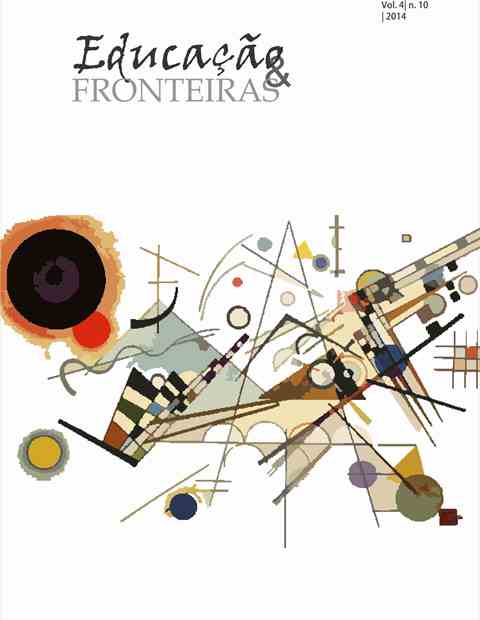Currículo emancipatório para Educação de Jovens e Adultos: uma construção possível
Mots-clés :
Currículo. Práticas Docentes. Educação de Jovens e Adultos.Résumé
Os estudos no campo do currículo têm sido alvo de debate e reflexão no cenário atual para todas as modalidades de ensino. Enquanto artefato cultural, o currículo cumpre várias funções nas instituições educacionais, sobretudo, nas instituições públicas de ensino notadamente na educação básica. Porém, o modo como o currículo se concretiza nas escolas e, em particular, nas salas de aulas, depende sempre da forma como os professores idealizam o ensino e a aprendizagem, podendo, por isso, desenvolvê-lo numa perspectiva mais técnica ou numa perspectiva mais crítica. É em torno do desenvolvimento do currículo numa perspectiva crítica e emancipatória que se estrutura o presente texto, no qual se divulgam alguns resultados obtidos num projeto de pesquisa sobre as práticas docentes, no primeiro segmento da Educação de Jovens e Adultos (EJA). O estudo desenvolveu-se em duas salas de aula de uma escola da rede pública municipal, envolveu duas professoras e trinta e seis estudantes. Em termos metodológicos recorremos à observação participante, entrevistas semiestruturadas e diário de campo. Os resultados obtidos permitiram inferir, com base nas práticas das professoras, que é necessário repensar o currículo tradicional para, a partir daí, se proceder à sua (re)construção numa perspectiva crítica e emancipatória.Téléchargements
Références
BRASIL. Constituição da República Federativa do Brasil, Brasília-DF,1998. Disponível em: www.amperg.org.br/store/legislação/constituicao/crfb.pdf Acesso em 18/02/2014.
_______. Proposta Curricular para Educação de Jovens e Adultos: Segundo Segmento do Ensino Fundamental: 5ª a 8ª série: Brasília, 2002.
_______. Diretrizes Curriculares Nacionais para a Educação de Jovens e Adultos. Relator Conselheiro Carlos Roberto Jamil Cury. Brasília, DF, 2000.
_______. Ministério da Educação. Secretaria da Educação Básica. Moreira, Antônio Flávio Barbosa; CANDAU, Vera Maria. Indagações sobre currículo: currículo, conhecimento e cultura. Brasília, DF: 2007, 48 p.
_______. Lei de Diretrizes e Bases da Educação Nacional: Lei nº 9.394/96. Apresentação Carlos Roberto Jamil Cury. Rio de Janeiro: DP&A, 2006.
CHIZZOTTI, Antonio. Pesquisa em ciências humanas e sociais. 2ª ed. São Paulo:Cortez, 1995.
FREIRE, Paulo. Pedagogia do oprimido. Rio de Janeiro: Paz e Terra, 1983.
______. Pedagogia da autonomia: saberes necessários à prática educativa. São Paulo: Paz e Terra, 2003.
______. Educação como prática de liberdade. Rio de Janeiro: Paz e Terra, 2006.
GIROUX, Henry. A escola crítica e a política cultural. São Paulo: Cortez, 1987.
GOMES, Carlos Alberto. A interacçãoselectiva na escola de massas. Sociologia, problemas e práticas. Braga, Portugal, 1987. (3), pp. 35-49.
LOPES, Alice C., MACEDO, Elizabete. O Pensamento Curricular no Brasil. In: LOPES, Alice C., & MACEDO, Elizabete. Currículo: Debate Contemporâneo. 2ª ed. São Paulo: Cortez, 2005.
MORGADO, José Carlos. Currículo e profissionalidade docente. Portugal: Porto Editora, 2005.
__________. Projeto curricular e autonomia da escola: das intenções às práticas. Revista Brasileira de Política e Administração da Educação (RBPAE), 2011. 27(3), 391-408.
MOREIRA, Antonio Flávio; SILVA, Tomaz Tadeu da. (Org). Currículo, cultura e sociedade. São Paulo: Cortez, 2001.
NÓVOA, António. Os professores e a sua formação. Lisboa: Publicações Dom Quixote, 1992.
PACHECO, José Augusto. O pensamento e acção do professor. Portugal: Porto Editora, 1995.
_________. Escritos curriculares. São Paulo: Cortez, 2005.
_________. Políticas currículares. Porto, Portugal: Porto Editora, 2002.
SACRISTÁN, José Gimeno. O currículo: uma reflexão sobre a prática. Trad. Ernani F. da Fonseca Rosa, 3ª ed. Porto Alegre: Artmed, 2000.
SOUZA, João. Francisco de. Prática pedagógica e formação de professores. Recife: Editora Bagaço, 2007.
SILVA, Tomaz Tadeu da. Documentos de identidade: uma introdução às teorias do currículo. Belo Horizonte: Autêntica, 1999, 156p.
______, Tomaz Tadeu da. Teorias do currículo: uma introdução crítica. Porto, Portugal: Porto Editora, 2000.









